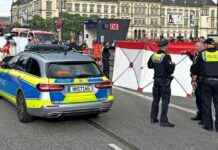The camp, where rats and pigeons meet, took place in May in the Parc de l’Étoile, under the windows of the town hall. On this old car park with burnt grass, barely a few trees and intense car traffic all around this gateway to the historic center of the Alsatian capital.
These Macedonians, Georgians, Albanians, Somalis or Russians, including some forty children, only have access to a single water point, the public toilets of the nearby bus station, to which are added four dry toilets installed Monday by the municipality.
“The State must absolutely assume its responsibility, we do not have the means to completely replace it”, warns the ecological mayor of Strasbourg, Jeanne Barseghian, who highlights the creation of 400 emergency accommodation places since her election.
“The government must review its migration policy so that the country of human rights is finally worthy of its reputation,” said the elected official, denouncing “accounting and dehumanized logic”.
“Everyone must take responsibility and not discard it on the other,” retorts the prefect Josiane Chevalier. This recalls that it is up to the town hall, owner of the land, to request the evacuation of the camp to justice.
Pleading for “a case-by-case approach” with sheltering depending on administrative situations, the State representative points out that, according to a check carried out at her request by the border police, “two thirds of people in the camp are in an irregular situation” and “are not intended to stay on our territory”.
“I will not let it be said that we are not doing our job”, affirms Josiane Chevalier, nevertheless ensuring that “the dialogue is not broken” with the municipality and that a meeting is planned for mid-September.
The two women are not their first publicly exposed disagreement, the most virulent having concerned the financing of a Turkish mosque in 2021.
Evacuated at the beginning of summer due to fireworks on July 14, the camp quickly reinvested the place after a few days of temporary accommodation in a requisitioned gymnasium and a transfer to a return assistance center (CAPR) for migrants without a residence permit.
An administrative “triage” under the guise of sheltering, denounces Antonio Gomez of the anti-racist collective “Besides we are from here”, some activists of which assume to have gone to look for the migrants at the CAPR to resettle them in the park of the Star.
The authorities “are pushing to drive out all the misery of this city, we like that they are stashed in parks, that they are invisible”, accused the activist, demanding “papers for all” and “the requisition of empty accommodation “during a gathering of a few dozen people organized on Monday in front of a barricaded prefecture.
Gabriel Cardoen, who goes almost every day to the camp to help, regrets him “political choices” on the reception reserved for migrants according to their origins after the strong mobilization reserved for Ukrainian refugees in the spring.
“When the weather conditions are less good, we will be able to force people to take shelter”, tries to explain, on the camp, Me Sophie Schweitzer to a Georgian family. The lawyer multiplies the summary proceedings before the administrative justice to try to accommodate the most vulnerable of those who have an asylum request under investigation. Only one was obtained for a Georgian in a wheelchair.
Perfectly French-speaking, Eldjona, 14, has already spent four years in Lorraine in various reception structures, before the young Albanian, her single mother and her two little sisters were forced to leave French territory in 2021.
To return last month to Strasbourg, “the city closest to the border”. “I want to study here and my mother was a cook… She could work. And I could become a lawyer”, explains the teenager, waiting for a place in college.
At the end of August, the collective “Pas d’enfants à la rue” had identified 25 school-age children in the camp. Only a few were able to make it back.




















